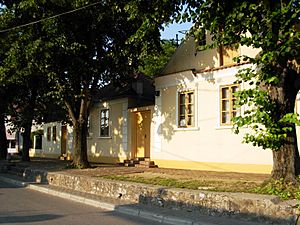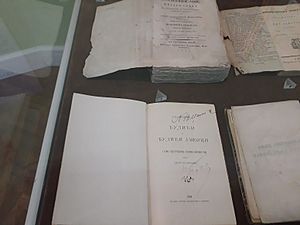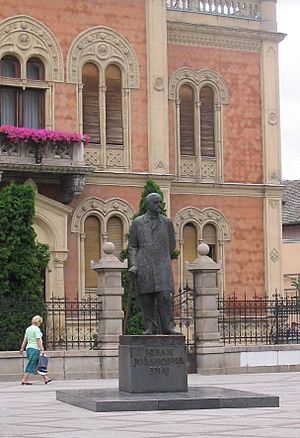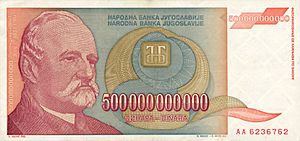Jovan Jovanović Zmaj facts for kids
Quick facts for kids
Jovan Jovanović Zmaj
Јован Јовановић Змај |
|
|---|---|
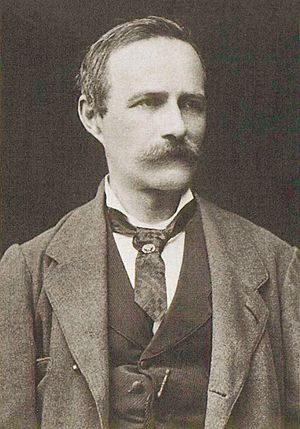 |
|
| Born | Jovan Jovanović 24 November 1833 Novi Sad, Austrian Empire (today Serbia) |
| Died | 1 June 1904 (aged 70) Sremska Kamenica, Austria-Hungary (today part of Novi Sad, Serbia) |
| Pen name | Zmaj |
| Nationality | Serbian |
| Notable works | Đulići, Đulići uveoci, Pevanija, Druga pevanija |
| Spouse | Ruža Ličanin |
| Signature | |
 |
|
Jovan Jovanović "Zmaj" (Serbian Cyrillic: Јован Јовановић Змаj) was a famous Serbian poet. He was born on November 24, 1833, and passed away on June 1, 1904.
Jovanović also worked as a doctor. He wrote many different kinds of poems, including love, lyric, patriotic, and political poems. However, he is most famous for his children's poetry. Many of his nursery rhymes are so well-known in Serbia that people sing them to their children without even knowing who wrote them! Jovanović also translated poems from famous writers like the Russians Lermontov and Pushkin, the Germans Goethe and Heine, and the American Longfellow.
Jovanović's nickname, Zmaj or Змај (which means "dragon"), came from an important meeting that happened on May 3, 1848.
Contents
About Zmaj's Life
Zmaj was born in Novi Sad on November 24, 1833. At that time, Novi Sad was part of the Austrian Empire. His family was old and respected. Zmaj's father, Pavle, became the mayor of Novi Sad after the Hungarian Revolution of 1848. His three brothers were soldiers and government officials who loved their country.
Even as a young child, Zmaj loved listening to and learning Serbian national songs. He started writing his own poems when he was still a boy. He went to elementary school in Novi Sad and then to secondary school in Halas and Preßburg (today Bratislava). Later, he studied law in Budapest, Prague, and Vienna. His father wanted him to study law, but Zmaj really wanted to study medicine.
Zmaj returned to his hometown and took an important job. However, his love for writing made him leave that job a year later to focus on his literary work. In 1870, Zmaj went back to Novi Sad to work as a doctor. He did this because his wife and children were suffering from tuberculosis.
His writing career began in 1849. In 1852, his first poem was published in a journal called Srbski Letopis (Serbian Annual Review). He wrote for this journal and others, like Neven and Sedmica. From that time until 1870, he wrote his own poems and translated many works. He translated from Hungarian the works of Sándor Petőfi and János Arany. From Russian, he translated works by Lermontov, and he also translated poems from some German and Austrian poets. In 1861, he edited a funny journal called Komarac (The Mosquito). In the same year, he started a literary journal called Javor and contributed many poems to it.
In 1861, Zmaj got married. In the years that followed, he wrote a collection of lyrical poems called Đulići. This collection is still considered one of his best works. In 1862, he had to stop publishing his journal Javor, which made him very sad. He was also interested in politics and supported the ideas of the United Serbian Youth. This was a movement that attracted many important people in Serbia during the 1860s and 1870s.
In 1863, Zmaj was chosen to be the director of the Tekelianum in Budapest. He went back to university to study medicine and became a doctor. Zmaj wrote many articles about hygiene, health, and good eating habits. He also wrote several scientific papers. He cared a lot about educating young Serbians. While he was in Budapest, he started a literary society called Preodnica and was its president. In 1864, he started a satirical journal called "Zmaj" ("The Dragon"). This journal was so popular that its name became part of his own name. In 1866, his funny play "Šaran" was performed and was very successful. In 1870, he began working as a doctor. He also strongly supported the idea of cremation. Important groups like Matica Srpska, the Serbian Medical Society, and the Serbian Literary Guild made Zmaj a full member.
In 1872, his wife passed away. After that, his only child who had outlived her mother also died. Zmaj had five children, but they all passed away. He was very sad and wrote many sad poems during this time. In 1873, he started another funny journal called Žiža. In 1877, he began an illustrated story about the Russo-Turkish War. In 1878, he started his popular comic journal Starmali. During this period, he wrote many poems and prose, including short novels.
Zmaj died on June 1, 1904, in Sremska Kamenica, Serbia. Many people attended his funeral, including royal princes and government officials.
Zmaj's Literary Works
Zmaj wrote lyrical songs that he collected under the titles Đulići (Little Rosebuds) and Đulići Uveoci (Faded Little Rosebuds). These are considered some of his most creative works. He also wrote six large books of his Pevanija (The Book of Songs), and several smaller collections. These included satires, short witty poems called epigrams, and many children's songs. His works were published in the United States by Robert Underwood Johnson, who was an editor and publisher of Century Magazine in New York City. Johnson was also a good friend of Nikola Tesla. Tesla himself even translated some of Zmaj's poems. Here is how the poet described what poetry means:
Where is Pain and dire Distress,
Songs shall soothe like soft caress;
Though the stoutest courage fails,
Song's an anchor in all gales;
When all others fail to reach,
Song shall be the thrilling speech;
Love and friends and comfort fled,
Song shall linger by your bed;
And when Doubt shall question, Why?
Song shall lift you to the sky.
Zmaj is best known for his poetry written for children. He was also one of the first authors to create comic strips in Serbia.
Zmaj's Lasting Impact
The Zmaj Children Games (Змајеве дечје игре/Zmajeve dečje igre) is one of the biggest festivals for children in Serbia. It is named after Jovan Jovanović Zmaj. The town of Sremska Kamenica was even called Zmajeva Kamenica (Zmaj's Kamenica) in his honor. He is also included in lists of The 100 most prominent Serbs. During his lifetime, Zmaj earned the title of the "people's poet." This showed how much people respected him, similar to a Poet laureate.
The writer August Šenoa spoke highly of Zmaj's poetry. A literary historian named Jovan Deretić believed Zmaj was one of the most important figures in Serbian Romanticism and Serbian literature of the late 1800s. Deretić praised his poems, his translations, and his satirical works.
Children's poetry written by Zmaj is still very popular today in Serbia and other parts of the Balkans region.
Works
Collections of poems
- Đulici
- Đulici uveoci
- Pevanija
- Druga pevanija
- Snohvatice I-III, 1895 and 1900
- Devesilje, 1900
- Istočni biser
- Pesme Mirca Shafije
- Čika Jova srpskoj omladini
- Istočni biser, 1861
Prose and Drama
- Vidosava Branković, 1860
- Šaran, 1864
- Nesrećna Kafina
Selected translations
- Herman i Doroteja by Johann Wolfgang von Goethe
- Sionsko jharfi, NeueZіonѕharfe, Zürіch, 1855
- Pesme Mirca Shafije
- Istočni biser, anthology of Eastern poetry, 1861
- Demon by Mikhail Lermontov, 1863
- Vitez Jovan, by Sándor Petőfi, 1860
- Aranj Toldi, 1858
- Toldijina starost
- Toldijina ljubav, 1896
- Otmu Muranj-grada, 1878
- Enoh Arden by Alfred, Lord Tennyson, 1880
- Čovekova tragedija, 1890
- Ifigenija u Tavridi by Johann Wolfgang von Goethe, 1898-1900
- Der Gott und die Bajadere by Johann Wolfgang von Goeth
See also
 In Spanish: Jovan Jovanovic Zmaj para niños
In Spanish: Jovan Jovanovic Zmaj para niños
 | William M. Jackson |
 | Juan E. Gilbert |
 | Neil deGrasse Tyson |


